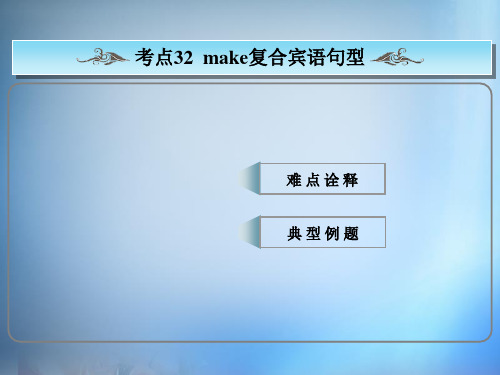make+宾语+宾补PPT课件
合集下载
Make的用法 初中九年级英语教学PPT课件 人教版

make 做、制造、制作
被动语态中常用 be made of / from, be made in, be made by等短语来表示“……是 由……制成的”,“……是在……制成的”和“……是被……制成的” 1 纸是木头制成的。 (看不出原材料)
The paper is made from wood . 2 桌子是木头制成的。( 看得出原材料)
Make 的用法
01
导入部分
02
make 做、制造、制作
03
make 的使动用法
04
make 的常用短语
05
总结归纳
06
巩固练习
教学重难点
教学 重点
make 的使动用法
Make
教学 难点
make + 宾语 + 宾补句型结构 make 的被动语态
课程导入
Mom is making a cake which makes baby happy
The desk is made of wood. 3 这些汽车是在长春制造的。(在某地制造)
பைடு நூலகம்These cars were made in Changchun.
make 的使动用法
当make的意思是“使、使得”时,一般用于“make + 宾语 + 宾 补”这种结构。 (1) make + sb. / sth. + adj. 意为“使某人或某物处于某种状态”。 这个消息使他很高兴。
The news made him happy.
(2)make + it+ adj.+ to do 通常用it作形式宾语 电脑使英语学习更加容易。 Computers make it easier to learn English.
人教英语九年级 Unit 11 使役动词make的用法总结(共14张PPT)-课件

1. The good news _m__a_d_e__u_s_e_x_c_it_e_d_.
(使我们兴奋)
2. We _m__a_d_e_h_i_m__h_e_a_d_m__a_s_te_r_ yesterday.
(选他当校长)
3. The funny man _m_a_d_e__th_e__g_ir_l_l_a_u_g_h__.
下雨的天气使他难过。
用法2:make + sb. / sth. +名词 表示“使…成为…”
eg: We all want to make Jim monitor.
我们都想让Jim当班长。
We made him headmaster.
我们选他为校长。
用法3:make + sb. / sth. +do sth(省略 to的不定式)
表示“使…做…”
eg: He made me laugh. 他使我大笑。
It makes me feel nervous. 它使我感到紧张。
注意: 当make 用于被动语态时,必须 带不定式符号to. 被动语态为 sb.be made to do
eg: The joke makes me laugh.
表o noisy. I can’t make my voice heard.
太吵了,我不能让别人听到我的声音。
You should speak clearly to make yourself understood.
你应该说清楚点让别人理解你。
try it out
I am made to laugh (by the joke).
eg:
Our teacher makes us retell the text.
《宾语补足语》课件

《宾语补足语》PPT课件
宾语补足语是指出现在及物动词后,表示对宾语的补充和说明的成分。它起 到限定和修饰宾语的作用,帮助我们更准确地了解宾语所表示的意义。
什么是宾语补足语
1 定义
2 作用
宾语补足语是及物动词后的修饰成分,用 来补充、说明宾语的意义。它可以是名词、 形容词、不定式或动名词。
宾语补足语能够进一步限定和修饰宾语, 使句子更加准确、丰富和生动。它提供了 宾语所表示意义的重要信息。
3 所属补足语
名词可以用来表示宾语所属的范围、所有关系或归属关系,如"公司","家庭"。
不定式作宾语补足语
目的补足语
不定式可以表示宾语的目的或 意图,如"学习英语","为了提 高技能"。
结果补足语
不定式可以表示宾语的结果或 效果,如"赚很多钱","使世界 更美好"。
补充说明
不定式可以用来补充说明宾语 的具体内容或方法,如"解决问 题","如何达到目标"。
宾语补足语的位置
宾语补足语通常紧跟在及物动词后面,与宾语一起形成一个整体,如"我发现他很有才华"。 但是有时宾语补足语也可以位于宾语之后,形成一个独立的谓语补足结构,如"我发现他是一个有才华 的人"。
宾语补足语的语态
宾语补足语的语态要和及物动词保持一致。
主动语态
当及物动词处于主动语态时,宾语补足语使 用主动形式,如"我帮助他解决问题"。
2
表达感受
形容词可以用来描述人的情感或感受,如"快乐的笑容","悲伤的故事"。
宾语补足语是指出现在及物动词后,表示对宾语的补充和说明的成分。它起 到限定和修饰宾语的作用,帮助我们更准确地了解宾语所表示的意义。
什么是宾语补足语
1 定义
2 作用
宾语补足语是及物动词后的修饰成分,用 来补充、说明宾语的意义。它可以是名词、 形容词、不定式或动名词。
宾语补足语能够进一步限定和修饰宾语, 使句子更加准确、丰富和生动。它提供了 宾语所表示意义的重要信息。
3 所属补足语
名词可以用来表示宾语所属的范围、所有关系或归属关系,如"公司","家庭"。
不定式作宾语补足语
目的补足语
不定式可以表示宾语的目的或 意图,如"学习英语","为了提 高技能"。
结果补足语
不定式可以表示宾语的结果或 效果,如"赚很多钱","使世界 更美好"。
补充说明
不定式可以用来补充说明宾语 的具体内容或方法,如"解决问 题","如何达到目标"。
宾语补足语的位置
宾语补足语通常紧跟在及物动词后面,与宾语一起形成一个整体,如"我发现他很有才华"。 但是有时宾语补足语也可以位于宾语之后,形成一个独立的谓语补足结构,如"我发现他是一个有才华 的人"。
宾语补足语的语态
宾语补足语的语态要和及物动词保持一致。
主动语态
当及物动词处于主动语态时,宾语补足语使 用主动形式,如"我帮助他解决问题"。
2
表达感受
形容词可以用来描述人的情感或感受,如"快乐的笑容","悲伤的故事"。
初中-英语-赞皇县第一中学-孙艳红-make+宾语+宾语补足语的用法-课件

(例句)The news makes me happy.
这则消息使我高兴。
Music makes me relaxed.
音乐使我放松。
3. make sb.+动词的过去分词
(用法)“make sb.+动词的过去分词”意为 “使某人被……”,有被动含义。通常情况 下,当make后的宾语是反身代词时,作宾语 补足语的动词要用过去分词,即:make oneself +过去分词。
我们选他当队长。
2. make sb./sth.+形容词
(用法)“make sb./sth.+形容词”意为“使某人/ 某物……”,此时形容词作宾语补足语。此类形容 词有happy,sad,pleased,angry,relaxed, scared,comfortable,sick,worried,easy等。
“make +宾语+宾语 补足语”的用法
学习要点:
学点1:make sb.+名词 学点2:make sb./sth.+形容词 学点3:make sb.+动词的过去分词 学点4:make sb./sth.+动词原形
1.make sb.+名词
(用法)“make sb+名词”意为“使某 人成为……”,名词作宾语补足语。 (例句)We make him the captain.
---Yes, but I try to make myself_______.
A. to speak; understood B. speaking; understand
C. to speak ; to understand D. speaking; understood
这则消息使我高兴。
Music makes me relaxed.
音乐使我放松。
3. make sb.+动词的过去分词
(用法)“make sb.+动词的过去分词”意为 “使某人被……”,有被动含义。通常情况 下,当make后的宾语是反身代词时,作宾语 补足语的动词要用过去分词,即:make oneself +过去分词。
我们选他当队长。
2. make sb./sth.+形容词
(用法)“make sb./sth.+形容词”意为“使某人/ 某物……”,此时形容词作宾语补足语。此类形容 词有happy,sad,pleased,angry,relaxed, scared,comfortable,sick,worried,easy等。
“make +宾语+宾语 补足语”的用法
学习要点:
学点1:make sb.+名词 学点2:make sb./sth.+形容词 学点3:make sb.+动词的过去分词 学点4:make sb./sth.+动词原形
1.make sb.+名词
(用法)“make sb+名词”意为“使某 人成为……”,名词作宾语补足语。 (例句)We make him the captain.
---Yes, but I try to make myself_______.
A. to speak; understood B. speaking; understand
C. to speak ; to understand D. speaking; understood
make用法PPT精品文档

• 3.be made+介词 • ①be made of 由……做成(能看出原料) • ②be made from 由……制成(看不出原料) • ③be made by 由/被(某人)做 • ④be made in 在某地被制造 • ⑤be made into 被制成…… • ⑥Be made up of 由…构成组成 • 例如: • Rice can be made into wine. 米可以酿成酒。 • Wine can be made from rice. 酒可以由米酿成。 • (注意主语的变化)
• 而be sure 则不受限制。如:
• ① Make sure to come to party on time. 一定 要准时来参加晚会。
• ② He is sure to call you up. 他准会给你打 电话的。
10
• 二、使,让(主语+谓语+宾语+宾语补足语) • 1.make sb do sth.使/让某人做某事
• Our English teacher often makes us retell the texts. 我们的英语老师经常让我们复述课文。
• 当把这样的句子变为被动语态时,原句中省略 的动词不定式符号to必须要还原。如把上面的句 子变为被动语态,应为:
• Ⅰ. be sure 指某人对某事或对某种情况有把握, 常译为:“确信”;
• make sure 指“务必、务请、确保”将某事弄清 楚。
• ① I am sure that he is honest. 我相信他是 诚实的。
• ② I have made sure that he is honest. 我已 了解清楚他是诚实的。
• We are often made to retell the texts (by our English teacher).
make使动用法总结PPT

语态一致
当make表示使动意义时,其后动词或动词 短语的语态(主动或被动)应与句子主语保 持一致。
遵循英语语法规则
使用正确的动词形式
在make使动用法中,要确保使用的动词或动词短语形式正确,如不定式、动名词等。
注意词语搭配
make使动用法中,要注意ke使动用法常见错误及纠正 方法
语义不同
使动用法强调主语对宾语或宾语补足语的影响或作用,有一 定的主观性;而被动用法则更注重描述客观事实,强调动作 本身。
02
常见make使动用法形式
make+宾语+动词原形
使某人/某物做某事
例如,He made me laugh. 他让我笑了。
强迫某人/某物做某事
例如,The boss made the employees work overtime. 老板强迫员工加班。
make+宾语+形容词或名词
使某人/某物处于某种状态
例如,The rain made the ground wet. 雨使地面湿了。
让某人/某物成为某种特征或身份
例如,His hard work made him a successful doctor. 他的努力使他成为了一 名成功的医生。
03
特点
make使动用法具有简洁明了、表达 力强的特点,能够使句子更加生动有 力。
使动用法分类
宾语补足语为动词不定式
例如,“He made me laugh.”在这个句子中,laugh是动词不定式作宾语补足语,表 示“他让我笑了”。
宾语补足语为过去分词
例如,“The news made him upset.”在这个句子中,upset是过去分词作宾语补足 语,表示“这个消息让他感到难过”。
主谓宾宾补ppt课件

You can call me Miss Zhou.
首页
Байду номын сангаас
目录
尾页
考点精讲
1, 我们叫他“小石头”。 We call him Little/Small Stone. 2,他给他儿子取名薛之谦。 He named his son Xue Zhiqian 3,我父亲认为它是个好主意。 My father thinks it a good idea 4,我发觉这是个好计划。 I find it a good idea.
首页
目录
尾页
考点精讲
4、我们将使我们的校园更加美丽! We will make our school more beautiful.
5、我们应该每天保持教室干净。 We should keep the classroom clean
every day. 6、 我们大家都认为他是诚实的。
We think him honest. 7、我觉得这部电影很有趣。
My sister wanted me to help him just now.
3、他们强迫迈克服从命令。
They forced Mike to obey the order. 4、警察命令他站起来。
The policeman ordered him to stand up.
首页
目录
尾页
考点精讲
4,这个故事使我很感动。 This story makes me moved.
首页
目录
尾页
特殊情况!
考点精讲
感官动词:see, watch, hear 使役动词:make
1, 我看见他过了马路。 I saw him cross the road.
首页
Байду номын сангаас
目录
尾页
考点精讲
1, 我们叫他“小石头”。 We call him Little/Small Stone. 2,他给他儿子取名薛之谦。 He named his son Xue Zhiqian 3,我父亲认为它是个好主意。 My father thinks it a good idea 4,我发觉这是个好计划。 I find it a good idea.
首页
目录
尾页
考点精讲
4、我们将使我们的校园更加美丽! We will make our school more beautiful.
5、我们应该每天保持教室干净。 We should keep the classroom clean
every day. 6、 我们大家都认为他是诚实的。
We think him honest. 7、我觉得这部电影很有趣。
My sister wanted me to help him just now.
3、他们强迫迈克服从命令。
They forced Mike to obey the order. 4、警察命令他站起来。
The policeman ordered him to stand up.
首页
目录
尾页
考点精讲
4,这个故事使我很感动。 This story makes me moved.
首页
目录
尾页
特殊情况!
考点精讲
感官动词:see, watch, hear 使役动词:make
1, 我看见他过了马路。 I saw him cross the road.
高考英语常考句式《make复合宾语句型》ppt课件

Nhomakorabea答案
A 本题考查 make的复合结构,“make+宾语+
形容词做宾补”在句中做原因状语。句意“因为他总是设
法让学生对他的课感兴趣,所以他很受学生的欢迎”。
◆
◆
He spoke loudly in order to make himself heard.他大声说为的是让 别人听见他。
◆
◆
He made it easy for us to understand the text.
◆
◆
We made him leader of our team. 我们选他做我们的领导人。
◆
◆
典型例题
典型例题
He is very popular among his students as
he always tries to make them ___ in his lectures.(07 江苏) A. interested B. interesting C. interest D. to interest
考点32 make复合宾语句型
难点诠释
典型例题
◆
◆
难点解析
Tom often makes his sister cry.
Tom经常惹他妹妹哭。
make sb do sth在主动语态中接不带to
的不定式作宾语补足语,但在被动语 态中接带to的不定式作宾语补足语。
◆
◆
We should do our best to make our country stronger and more beautiful. 我们应该尽力使我们的国家更美好。
A 本题考查 make的复合结构,“make+宾语+
形容词做宾补”在句中做原因状语。句意“因为他总是设
法让学生对他的课感兴趣,所以他很受学生的欢迎”。
◆
◆
He spoke loudly in order to make himself heard.他大声说为的是让 别人听见他。
◆
◆
He made it easy for us to understand the text.
◆
◆
We made him leader of our team. 我们选他做我们的领导人。
◆
◆
典型例题
典型例题
He is very popular among his students as
he always tries to make them ___ in his lectures.(07 江苏) A. interested B. interesting C. interest D. to interest
考点32 make复合宾语句型
难点诠释
典型例题
◆
◆
难点解析
Tom often makes his sister cry.
Tom经常惹他妹妹哭。
make sb do sth在主动语态中接不带to
的不定式作宾语补足语,但在被动语 态中接带to的不定式作宾语补足语。
◆
◆
We should do our best to make our country stronger and more beautiful. 我们应该尽力使我们的国家更美好。
人教版高三英语一轮复习 make+宾语 + 宾补 课件

we should take some measures to protect ourselves. First ,I think,
staying at home is a good way to make us stay safe. Besides,washing
hands frequently and wearing masks when going out make it
5
•
You know, the situation of the covid-19 is still severe now,
which will make people around the world fighting against it for a long time.
•
Being exposed to the covid-19 will make us infected quickly, so
人教版高中英语
使役动词make的用法
1
• 学习目标:
1.掌握make作为使役动词的几种用法。 2.培养学生的归纳总结能力,进而提高学习效率。 3.培养学生学习英语的兴趣以及感恩之心和积极向上的生活态 度。
2
Steps of Learning
Make+宾语+宾补
V-ing V-ed do Adj.
7
Being exposed to the covid-19 will make us infected quickly, so we should take some measures to protect ourselves.
小结
2、“make+宾语+V-ed(过去分词作宾 补)”宾语与宾补之间为被动关系,意为
宾语补足语ppt课件

He is kicking the door
_o_p_e_n_.
精品课件
8
Object cΒιβλιοθήκη mplement 宾语补足语宾语补足语对宾语作出进一步的补充说明。
They called her the Loulan Beauty.
在这句话中,her是宾语,the Loulan Beauty 作宾语补足语,补充说明宾语her的情况。
精品课件
22
1. 我害怕看到你这么快就离开。
2. I hate to see you leave so soon.
2. 我听见有人走上楼梯。
3. I heard someone come up the stairs.
4. = someone was heartdo_c_o_m__e__u_p___the stairs.
Usage: An object complement, which gives information about the object, can be a noun, a noun phrase, an adjective, a to-infinitive, a bare infinitive, or a prepositional phrase, present participle ,past participle.
精品课件
4
What are they doing?
They are painting the house _b_l_u_e__.
What is the little girl doing? She is painting the house _w_h_i_t_e.
精品课件
5
Very loud noises can drive people _m__a_d_/_.
_o_p_e_n_.
精品课件
8
Object cΒιβλιοθήκη mplement 宾语补足语宾语补足语对宾语作出进一步的补充说明。
They called her the Loulan Beauty.
在这句话中,her是宾语,the Loulan Beauty 作宾语补足语,补充说明宾语her的情况。
精品课件
22
1. 我害怕看到你这么快就离开。
2. I hate to see you leave so soon.
2. 我听见有人走上楼梯。
3. I heard someone come up the stairs.
4. = someone was heartdo_c_o_m__e__u_p___the stairs.
Usage: An object complement, which gives information about the object, can be a noun, a noun phrase, an adjective, a to-infinitive, a bare infinitive, or a prepositional phrase, present participle ,past participle.
精品课件
4
What are they doing?
They are painting the house _b_l_u_e__.
What is the little girl doing? She is painting the house _w_h_i_t_e.
精品课件
5
Very loud noises can drive people _m__a_d_/_.
make、with+宾语+宾补(复合结构)

(不定式)
I can't go out to play with all these clothes to wash (wash).
make+宾语+宾补结构
2019.8.20
2.In the future, terrorists may “attack” the world's computers, cause chaos, and make planes and trains crash.
③make + 宾语 + do sth. 使,让 你可以让你的梦想实现 e.g. You can make your dream come true.
make + 宾语 + 宾补”结构:
④make + 宾语 + done 使... ... (注意:在这种结构中,宾语往往是反身代词,宾语和宾补之间是逻辑上的 动宾关系) 意思:使自己被别人...... e.g. The speaker raised his voice in order to make himself heard.
• 1. with + 宾语 + 过去分词 (强调宾语是 过去分词动作的承受者(被动) 或表示动作已经发生)
• e.g. He sat there with his eyes closed (close).他闭目坐在那儿。 • All the afternoon he worked with the door locked (lock).
new products faster and at a lower cost.
with+宾语+宾补结构 【复习】
【复习】with+ 宾语 + 宾补”结构:
宾语补足语课件(共28张PPT)

I wish you to have a good trip. I would prefer you to stay for the dinner.
2) 跟不带to的不定式作宾语补足语。常见 的这类动词有“一感(feel)、二听 (listen to, hear), 三让 (make, let, have), 四 看”(look at, see, watch, notice) 如:
Let’s have a rest. 让我们休息一会儿。 但这种结构变成被动语态时,to必须加上。
如: He was seen to leave the room with a
book in his hand. 有人见他手拿着一本书离开这个房间。 3) 跟带to或不带to的动词不定式作宾语补 足语。这类动词只有help。如:
He got his leg injured.
⑥ Let’s have a rest.
常见的动词有很多,如advise, allow, ask, beg, cause, expect, want, force, inspire, invite, order, permit,remind, request等。
We found it very difficult to solve the problem.
How can you keep them waiting for so long?
Suddenly I found my wallet stolen.
Keep the door closed.
宾语补足语可以由这九类来承担: n. / adj. /adv. / 介词短语 / v.原型 / ing/ v-ed / to do / to be 1.We chose him our monitor.
2) 跟不带to的不定式作宾语补足语。常见 的这类动词有“一感(feel)、二听 (listen to, hear), 三让 (make, let, have), 四 看”(look at, see, watch, notice) 如:
Let’s have a rest. 让我们休息一会儿。 但这种结构变成被动语态时,to必须加上。
如: He was seen to leave the room with a
book in his hand. 有人见他手拿着一本书离开这个房间。 3) 跟带to或不带to的动词不定式作宾语补 足语。这类动词只有help。如:
He got his leg injured.
⑥ Let’s have a rest.
常见的动词有很多,如advise, allow, ask, beg, cause, expect, want, force, inspire, invite, order, permit,remind, request等。
We found it very difficult to solve the problem.
How can you keep them waiting for so long?
Suddenly I found my wallet stolen.
Keep the door closed.
宾语补足语可以由这九类来承担: n. / adj. /adv. / 介词短语 / v.原型 / ing/ v-ed / to do / to be 1.We chose him our monitor.
主语+及物动词+宾语+宾补

精品PPT
【注意】
若变为被动语态, 其后的宾语补足语就成 为主语补足语了, 此时作主语补足语的不定式 要带to。如: The boss made him work overtime.(主动 (zhǔdòng)语态)
He was made to work overtime.(被动语态)老 板叫他加班。
主语及物动词宾语宾补 精品ppt精品ppt we elected li yang our monitor. (li yang ourmonitor) newsmade us sad. (we were sad)精品ppt call, name, make, elect, appoint, nominate crown,think, consider, leave presidentappointed john manager marketing.精品ppt newsmade me happy.精品ppt make, paint, dye, get (ready), cut (short), set (free), keep, drive (mad), find, want, hold (responsible), wish, like, see, imagine, turn, beat (black blue),boil (hard), suppose, prove, think, believe, consider, leave精品ppt foundmyself heencouraged her workharder.精品ppt advise,allow, ask, beg, cause, choose, encourage, expect, force, get, invite, order, permit, persuade, request, tell, want, warn, wish he always has others wait him.精品ppt do let,make, have observe,feel, hear, listen notice,see, watch精品ppt bossmade him work overtime.( workovertime.( don'tleave waterrunning after you have washed your hands. heardmy name called.精品ppt catch,feel, find, get, have, hear, keep, leave, listen notice,observe, see, set, smell, watch精品ppt verypleasant yourfamily.精品ppt she
【注意】
若变为被动语态, 其后的宾语补足语就成 为主语补足语了, 此时作主语补足语的不定式 要带to。如: The boss made him work overtime.(主动 (zhǔdòng)语态)
He was made to work overtime.(被动语态)老 板叫他加班。
主语及物动词宾语宾补 精品ppt精品ppt we elected li yang our monitor. (li yang ourmonitor) newsmade us sad. (we were sad)精品ppt call, name, make, elect, appoint, nominate crown,think, consider, leave presidentappointed john manager marketing.精品ppt newsmade me happy.精品ppt make, paint, dye, get (ready), cut (short), set (free), keep, drive (mad), find, want, hold (responsible), wish, like, see, imagine, turn, beat (black blue),boil (hard), suppose, prove, think, believe, consider, leave精品ppt foundmyself heencouraged her workharder.精品ppt advise,allow, ask, beg, cause, choose, encourage, expect, force, get, invite, order, permit, persuade, request, tell, want, warn, wish he always has others wait him.精品ppt do let,make, have observe,feel, hear, listen notice,see, watch精品ppt bossmade him work overtime.( workovertime.( don'tleave waterrunning after you have washed your hands. heardmy name called.精品ppt catch,feel, find, get, have, hear, keep, leave, listen notice,observe, see, set, smell, watch精品ppt verypleasant yourfamily.精品ppt she
- 1、下载文档前请自行甄别文档内容的完整性,平台不提供额外的编辑、内容补充、找答案等附加服务。
- 2、"仅部分预览"的文档,不可在线预览部分如存在完整性等问题,可反馈申请退款(可完整预览的文档不适用该条件!)。
- 3、如文档侵犯您的权益,请联系客服反馈,我们会尽快为您处理(人工客服工作时间:9:00-18:30)。
2.In the future, terrorists may “attack” the world's computers, cause chaos, and make planes and trains crash.(将来,恐怖分子可能会“攻击”全世界的计算机,引起混乱,使
飞机坠毁,让火车相撞。)
.
6
• 3. with + 名词 + to do (动作尚未发生) • I can’t go out with all these clothes to wash.要洗这些衣服,我无法出去
了。 • With so many people to help us, we are sure to finish it in time. • 有这么多人帮忙,我们一定能按时完成。
.
3
单句语法填空。 1. He raised his voice to make himself heard (hear). 2. He is very popular among his students as he always tries to make them interested (interest) in his classes. 3. Paul doesn't have to be made to learn (learn). He always works hard. 4.(2012·四川) New technologies have made it possible to turn out new products faster and at a lower cost.
.
7
• 4.with + sb./sth. + 形容词/副词(强调名词的特性或状态) • He often sleeps with the windows open.他常开着窗睡觉。 • He stood before his teacher with his head down.他低着头站在老师面前。 • He was lying on the bed with all his clothes on.他和衣躺在床上。
.
9
.
8
• 5. with+sb./sth.+名词 • He died with his daughter yet a schoolgirl.他去世时,女儿还是个小学生。 • 6. With + sb./sth. + 介词短语 • She said good-bye with tears in her eyes. 她含着眼泪说了声再见。
.2Biblioteka ④make + 宾语 + done 使... ...(在这种结构中,宾语 往往是反身代词,宾语和宾补之间是逻辑上的动宾 关系) 使自己被别人...... e.g. The speaker raised his voice in order to make himself heard. ⑤make + it (形式宾语)+ n. / adj.+ to do sth. /that...(真正的宾语) e.g.
整个下午他都锁着门在房里工作。
.
5
• 2. with + 名词 + -ing分词(强调名词是 -ing分词的动作的发出者 或某动作,状态正在进行) • He fell asleep with the lamp burning.他没熄灯就睡着了。 • I won’t be able to go on holiday with my mother being ill. • 因为妈妈有病,我无法去度假。
本句是一个简单句,and 连接三个并列的谓语 动词。
make 在此是使役动词,后面的 crash 是省略to的 不定式作宾补。
.
1
考点提炼:“make + 宾语 + 宾补”结构: ① make + 宾语 + adj. 使... ...变得... ... e.g. Music makes your life colorful. ②make + 宾语 + n. 使... ...成为... ... e.g. We made him our monitor. ③make + 宾语 + do sth. 使,让 e.g. You can make that dream come true.
.
4
“with + 复合结构”又称为“with结构”,即with+宾语+ 宾补,在句中表状态或说明背景情况,常做伴随,方式, 原因,条件等状语。具体结构如下:
•1. with + sb./sth. + -ed 分词 (强调名词是 -ed分 词动作的承受者或动作已经发生)
•e.g. He sat there with his eyes closed.他闭目坐在那儿。 • All the afternoon he worked with the door locked.
飞机坠毁,让火车相撞。)
.
6
• 3. with + 名词 + to do (动作尚未发生) • I can’t go out with all these clothes to wash.要洗这些衣服,我无法出去
了。 • With so many people to help us, we are sure to finish it in time. • 有这么多人帮忙,我们一定能按时完成。
.
3
单句语法填空。 1. He raised his voice to make himself heard (hear). 2. He is very popular among his students as he always tries to make them interested (interest) in his classes. 3. Paul doesn't have to be made to learn (learn). He always works hard. 4.(2012·四川) New technologies have made it possible to turn out new products faster and at a lower cost.
.
7
• 4.with + sb./sth. + 形容词/副词(强调名词的特性或状态) • He often sleeps with the windows open.他常开着窗睡觉。 • He stood before his teacher with his head down.他低着头站在老师面前。 • He was lying on the bed with all his clothes on.他和衣躺在床上。
.
9
.
8
• 5. with+sb./sth.+名词 • He died with his daughter yet a schoolgirl.他去世时,女儿还是个小学生。 • 6. With + sb./sth. + 介词短语 • She said good-bye with tears in her eyes. 她含着眼泪说了声再见。
.2Biblioteka ④make + 宾语 + done 使... ...(在这种结构中,宾语 往往是反身代词,宾语和宾补之间是逻辑上的动宾 关系) 使自己被别人...... e.g. The speaker raised his voice in order to make himself heard. ⑤make + it (形式宾语)+ n. / adj.+ to do sth. /that...(真正的宾语) e.g.
整个下午他都锁着门在房里工作。
.
5
• 2. with + 名词 + -ing分词(强调名词是 -ing分词的动作的发出者 或某动作,状态正在进行) • He fell asleep with the lamp burning.他没熄灯就睡着了。 • I won’t be able to go on holiday with my mother being ill. • 因为妈妈有病,我无法去度假。
本句是一个简单句,and 连接三个并列的谓语 动词。
make 在此是使役动词,后面的 crash 是省略to的 不定式作宾补。
.
1
考点提炼:“make + 宾语 + 宾补”结构: ① make + 宾语 + adj. 使... ...变得... ... e.g. Music makes your life colorful. ②make + 宾语 + n. 使... ...成为... ... e.g. We made him our monitor. ③make + 宾语 + do sth. 使,让 e.g. You can make that dream come true.
.
4
“with + 复合结构”又称为“with结构”,即with+宾语+ 宾补,在句中表状态或说明背景情况,常做伴随,方式, 原因,条件等状语。具体结构如下:
•1. with + sb./sth. + -ed 分词 (强调名词是 -ed分 词动作的承受者或动作已经发生)
•e.g. He sat there with his eyes closed.他闭目坐在那儿。 • All the afternoon he worked with the door locked.
